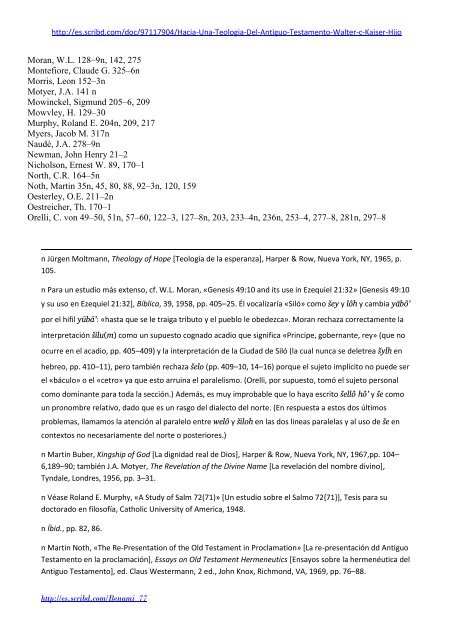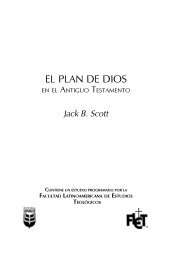Hacia una Teologia del Antiguo Testament - Walter C. Kaiser Jr_
- No tags were found...
Create successful ePaper yourself
Turn your PDF publications into a flip-book with our unique Google optimized e-Paper software.
http://es.scribd.com/doc/97117904/<strong>Hacia</strong>-Una-<strong>Teologia</strong>-Del-<strong>Antiguo</strong>-<strong>Testament</strong>o-<strong>Walter</strong>-c-<strong>Kaiser</strong>-Hijo<br />
Moran, W.L. 128–9n, 142, 275<br />
Montefiore, Claude G. 325–6n<br />
Morris, Leon 152–3n<br />
Motyer, J.A. 141 n<br />
Mowinckel, Sigmund 205–6, 209<br />
Mowvley, H. 129–30<br />
Murphy, Roland E. 204n, 209, 217<br />
Myers, Jacob M. 317n<br />
Naudé, J.A. 278–9n<br />
Newman, John Henry 21–2<br />
Nicholson, Ernest W. 89, 170–1<br />
North, C.R. 164–5n<br />
Noth, Martin 35n, 45, 80, 88, 92–3n, 120, 159<br />
Oesterley, O.E. 211–2n<br />
Oestreicher, Th. 170–1<br />
Orelli, C. von 49–50, 51n, 57–60, 122–3, 127–8n, 203, 233–4n, 236n, 253–4, 277–8, 281n, 297–8<br />
n Jürgen Moltmann, Theology of Hope [Teología de la esperanza], Harper & Row, Nueva York, NY, 1965, p.<br />
105.<br />
n Para un estudio más extenso, cf. W.L. Moran, «Genesis 49:10 and its use in Ezequiel 21:32» [Genesis 49:10<br />
y su uso en Ezequiel 21:32], Bíblica, 39, 1958, pp. 405–25. Él vocalizaría «Siló» como šey y lôh y cambia yāb ’<br />
por el hifil yūbā’: «hasta que se le traiga tributo y el pueblo le obedezca». Moran rechaza correctamente la<br />
interpretación šilu(m) como un supuesto cognado acadio que significa «Principe, gobernante, rey» (que no<br />
ocurre en el acadio, pp. 405–409) y la interpretación de la Ciudad de Siló (la cual nunca se <strong>del</strong>etrea šylh en<br />
hebreo, pp. 410–11), pero también rechaza šelo (pp. 409–10, 14–16) porque el sujeto implícito no puede ser<br />
el «báculo» o el «cetro» ya que esto arruina el paralelismo. (Orelli, por supuesto, tomó el sujeto personal<br />
como dominante para toda la sección.) Además, es muy improbable que lo haya escrito šell h ’ y še como<br />
un pronombre relativo, dado que es un rasgo <strong>del</strong> dialecto <strong>del</strong> norte. (En respuesta a estos dos últimos<br />
problemas, llamamos la atención al paralelo entre welô y šiloh en las dos lineas paralelas y al uso de še en<br />
contextos no necesariamente <strong>del</strong> norte o posteriores.)<br />
n Martin Buber, Kingship of God [La dignidad real de Dios], Harper & Row, Nueva York, NY, 1967,pp. 104–<br />
6,189–90; también J.A. Motyer, The Revelation of the Divine Name [La revelación <strong>del</strong> nombre divino],<br />
Tyndale, Londres, 1956, pp. 3–31.<br />
n Véase Roland E. Murphy, «A Study of Salm 72(71)» [Un estudio sobre el Salmo 72{71}], Tesis para su<br />
doctorado en filosofía, Catholic University of America, 1948.<br />
n Íbid., pp. 82, 86.<br />
n Martin Noth, «The Re-Presentation of the Old <strong>Testament</strong> in Proclamation» [La re-presentación dd <strong>Antiguo</strong><br />
<strong>Testament</strong>o en la proclamación], Essays on Old <strong>Testament</strong> Hermeneutics [Ensayos sobre la hermenéutica <strong>del</strong><br />
<strong>Antiguo</strong> <strong>Testament</strong>o], ed. Claus Westermann, 2 ed., John Knox, Richmond, VA, 1969, pp. 76–88.<br />
http://es.scribd.com/Benami_77



